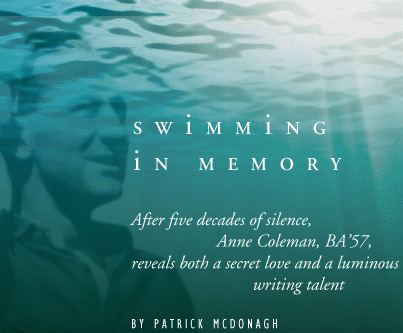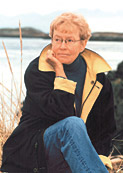
"...I have been lying on the dock staring down into the dark green depths. It is too deep to see the bottom and sunrays beam up towards me in yellow ladders." The year is 1950, and the person gazing into the waters is the 14-year-old Anne Coleman. She spends her summers in North Hatley, in Quebec's Eastern Townships, swimming, boating and reading Tolstoy and the BrontEBs, whose novels also have fascinating shadowy depths. And she thinks about the dashing author who lives nearby, Mr. MacLennan.

Fifty years on, and Coleman has been thinking about him again. In September, McClelland and Stewart released I'll Tell You A Secret: A Memory of Seven Summers, her first published work. Only weeks later the book was shortlisted for a Governor General's Literary Award and Coleman has become an instant literary celebrity. In the Globe and Mail, Sarah Sheard describes her as "a writer of pages that slide like silk," and in the Montreal Gazette, Marianne Ackerman calls the memoir "a great book." One reason for all the attention being given her, of course, is the prominent role played in the work by Hugh MacLennan, the McGill professor and CanLit icon who wrote Two Solitudes, Barometer Rising and The Watch That Ends the Night.
But those who scan her opening pages because of the MacLennan connection continue for other reasons. The relationship with "Mr. MacLennan," as he is known throughout the book, forms the promised secret, but there are other surprises, most notably the memoir's emotional strength and solidity. Coleman's present-tense narrative story captures the immediacy and visceral force of adolescence, and holds that spell throughout. She conjures the spirit of an intellectually aware but inexperienced girl, with all her willfulness, doubts and insecurities -- as well as a strength that pushes her beyond her fears.

Author Anne Coleman at home in British Columbia.
In 1950, the 43-year-old MacLennan drives his car by Coleman as she walks along the road and offers her a lift. The distant object of her schoolgirl crush suddenly becomes a real person, one who, much to her surprise, knows her name. For his part, MacLennan seems bemused by the gangly, precocious teenager, part child, part adolescent. Coleman's crush soon becomes an obsession, and by the end of the seven years covered in the memoir, MacLennan seems equally interested in her. No longer bemused and, because of his wife's death, no longer married, he is now bewildered, uncertain and available. Neither Coleman nor MacLennan manages to cross the distance between them, though, and the friendship ends when Coleman marries, at the age of 21, a man that everyone -- including herself -- knows to be a terrible choice.
Before the marriage, Coleman and MacLennan have one of their most intimate exchanges. "I feel as if I'm advancing towards a cliff and I'm going to fall over it. I can't stop what is going to happen. It's my doom," she confides to him, hoping that he will say something -- even in the form of simple paternal or professorial advice -- to allow her to change her mind. While MacLennan recognizes her dilemma, he offers no help. Instead, he responds, "I've lived too long in the Valley of the Shadow to be your answer, Anne. That's the terrible truth."
So Coleman marries Frank, a Yugoslavian refugee, with MacLennan, at her insistence, in attendance. At her reception, he says, "Well, Anne, you've gone and done it," and later the newly wed couple drives off, the bride in tears, to begin married life.
"I hadn't really thought about his 'Valley of the Shadow' line," says Coleman today. "I didn't revisit it, which is one of the reasons I think the memory came back so vividly. It wasn't something I had gone over many times."


